‘The Small Cloud of Evil’: Highlights from The American Civil War Collection, 1860-1922
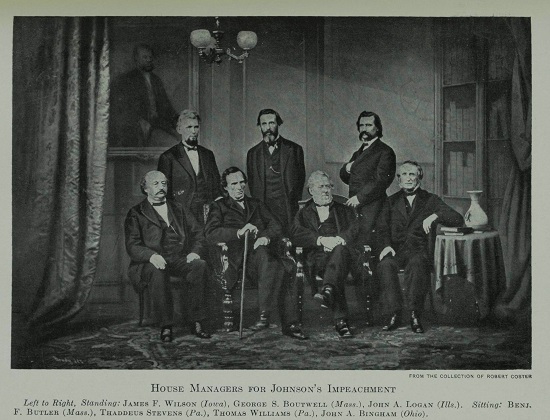
The December release of The American Civil War Collection, 1860-1922: From the American Antiquarian Society includes an array of primary source material. These valuable items range from shorter imprints, such as sermons delivered during the war, to lengthier political histories and biographies published years later.
Our Duty Under Reverse: A Sermon (1861)
By John Fothergill Waterhouse Ware
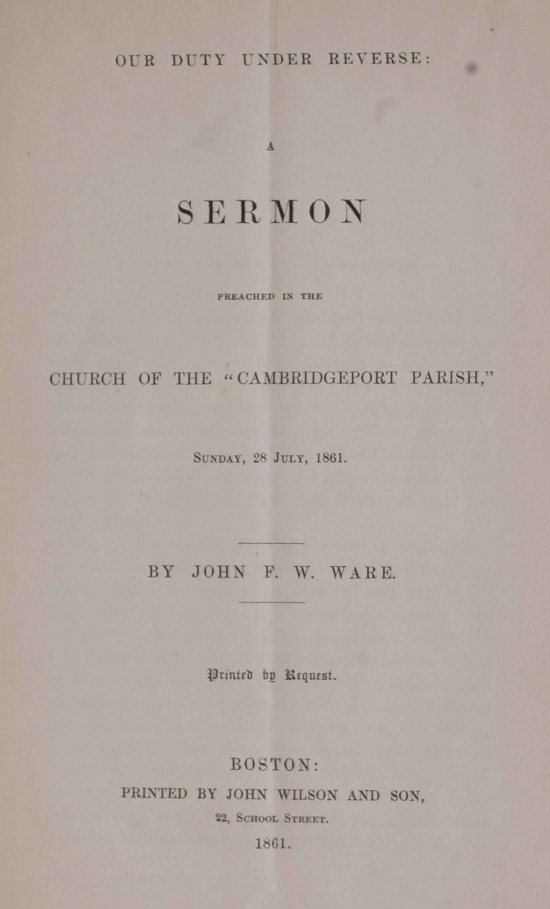
One week after the First Battle of Bull Run, Unitarian clergyman John Fothergill Waterhouse Ware (1818-1881) delivered this sermon in the Boston church of “Cambridgeport Parish.” He begins by acknowledging the favor Providence has shown the country, and then addresses the nation’s failure to live up to the duties accompanying that blessing. He identifies the fault that led to the country’s current conflict.
We struck the parricidal blow when at the height of our prosperity. The principle on which our fathers builded [sic] was stigmatized as a “sounding and glittering generality.” Men who held to the old faith of the founders were taunted about a “higher law.” Slavery, in the early day, the small cloud of evil, in ours had swelled to the gigantic, overmastering tyranny; ever more and more imperious, getting, only to cry “more.” Nothing it asked for but it had. Compromise sapped the manhood, the integrity, of the North. Trade, manufactures, social position, expediency, party policy, fiercely seconded the most exorbitant demand. Slavery became national; and, before the slave-power, this fair, vast heritage, sacred to freedom, trembled, yielded, and was all but lost.
Now, it is impossible that such desertion of principle, such timid yielding, should go unpunished. We had barely surrendered that which came to us consecrated by the trials, tears, prayers, blood, of our ancestors. We had the advance post in the great cause of civilization and Christianity, and we fled from it in base and causeless panic. We talked of freedom; our boast was, that the humblest, seeking the protection of our flag, was safe: while we gave the lie to all, not by the existence of slavery, which we could not help; not by its horrors, which we could not control; but by fawning before its power, helping it to any thing it desired. Esau sold his birthright when he was starving; and the name of that poor, starving man has gone to the ages in undeserved opprobrium. We bartered ours when we were full, and that we might hold to our trade and our manufactures, our comfort and our gold,—to peace, though bought at the price of disgrace,—consented to yield our trust. It is the blackest blot on the record of human history.
The Preservation of the Republic (1862)
By Augustus Woodbury

Augustus Woodbury (1825-1895) was the Pastor of Westminster Unitarian Church in Providence, Rhode Island, for 35 years. In this sermon, delivered as the Civil War entered its second year, Woodbury summarizes the conflict while evoking the American Revolution in a Fourth of July oration.
The men of the nation on the field of battle, the women of the nation in the hospital and at their homes, are alike contending for civilization, loyalty and freedom, against barbarism, treason and slavery. The conflicting ideas of our national life interchange hostilities at the point of the bayonet and the cannon’s mouth. The prairies of the West, the hillsides and valleys of Virginia, the islands of the South and the waters of the Mississippi, have witnessed the sacrifices, the exploits, the brave living and noble dying, which seem to recall the heroic ages. The catalogue of names which have shed new lustre on American history, has become almost too tedious to recite. The army and the navy, the council board, the Executive chamber, have shown, that for bravery, skill, administrative power and knowledge of affairs, the sires of ’76 have no cause to be ashamed of the sons of ’62. Now, as then, the martyrs to the cause of a nation’s independence, leaving a trail of glory as they have passed away, above the smoke and din of battle, are manifesting the supreme value of liberty. Divine Providence, subjecting the nation to this severe discipline of strife, is proving to us, that national existence and the blessings of a free government, which demanded of the fathers a sublime patience and untold suffering, are worth, to the sons, all the treasure, tears, toils and blood which now they cost.
The Life of Thaddeus Stevens (1913)
By James Albert Woodburn

Written nearly 50 years after the Civil War, James Albert Woodburn’s biography of Thaddeus Stevens, focuses on his role as a leader of the Radical Republican faction of the party in the 1860s.
Thaddeus Stevens was the dominant figure in the American Congress during this notable period. It may reasonably be claimed that no more masterful leader ever directed the politics and legislation of the House of Representatives. The House under Stevens was not ruled by a system that created a one-man official power. A man then led the House according to his strength and the strength of his cause. Stevens was given no set of rules that arbitrarily suppressed opposition.
Woodburn continues, writing:
During the War, under the leadership of Lincoln, the presidency was the dominant department of the government. In Reconstruction the presidency was subordinate, if not impotent, and the Congressional arm of the government was all-powerful. In that period the leadership of Stevens, especially of his party majority in the House, was unquestioned. His career there and his speeches throughout the bitter period of war and the more bitter strife that followed the war offer a subject for study that no historian can neglect.
The acrid post war political climate would reach its zenith in 1868.
The movement for the removal of Andrew Johnson found its cause in the politics of the time. His impeachment was essentially a political issue, as Stevens very frankly declared, with his usual habit of bold avowal and unconcealment.
Describing the sectarian antipathy, Woodburn writes:
A political condition existed in the country in which Congress and the President were at war. It was an impossible situation, and no constitution of government should ever permit it to exist. The Executive and the Legislative had denounced one another beyond the limit of decency. The country had given to Congress such a majority as enabled that body to reduce the President to impotency, yet they were without an Executive of their own with a heart to carry out the nation’s will. The President had obstinately determined that, wherever he could, he would defeat and circumvent, nag and annoy, the responsible legislative leaders, and he would go to the bounds of the law in opposition to the public will as expressed in Congress.

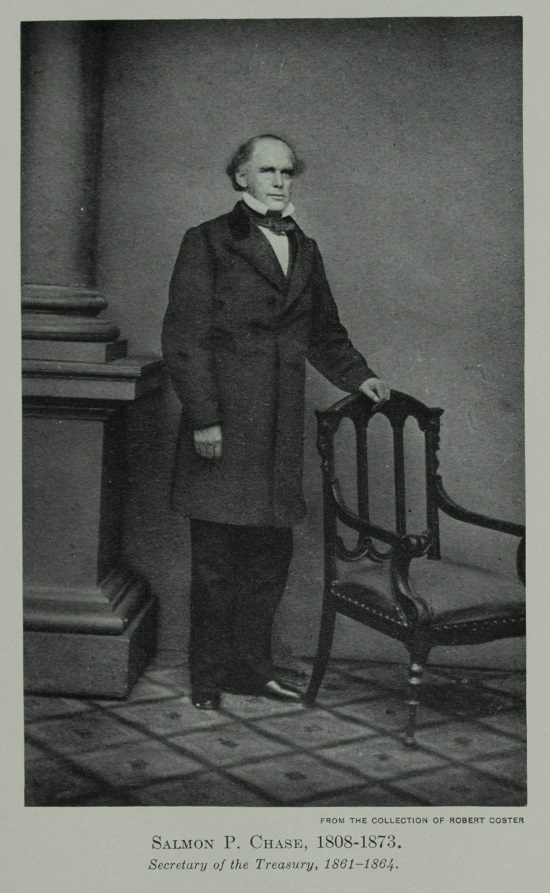
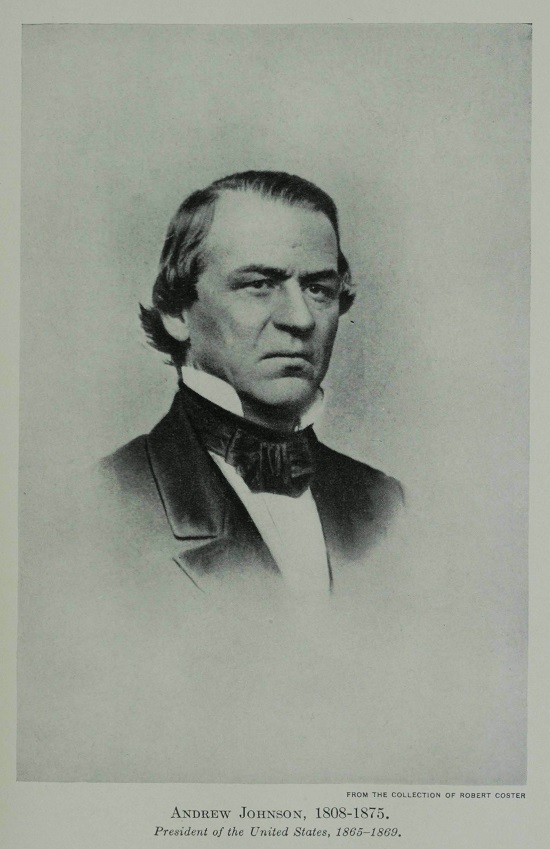
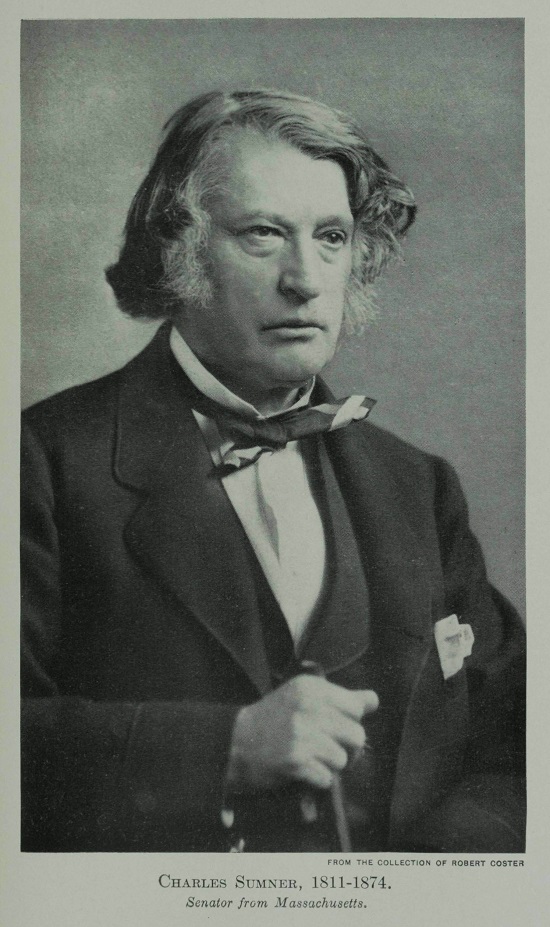
To learn more about bringing this digital collection to your library, please contact Readex Marketing.



